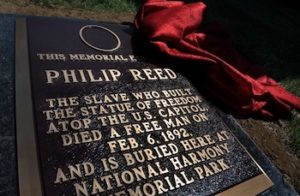
*The birth of Philip Reed is celebrated on this date, c. 1820. He was a Black master craftsman.
He was born into slavery in South Carolina's historic city of Charleston. Also known as Philip Reid, he worked at the foundries of self-taught sculptor Clark Mills. He was emancipated on April 16, 1862, under the District of Columbia Compensated Emancipation Act.
After his emancipation, he assisted Mills in installing the Statue of Freedom atop the United States Capitol, which was completed on December 2, 1863. Reid began working as an enslaved apprentice to Mills in 1842 as a young man in his twenties who was already recognized for his talents in the foundry industry. In the 1860s, after having worked at the foundry for almost two decades, Reid's skills in working with bronze casting were recognized.
Reed died on February 6, 1892, and was buried in the Graceland Cemetery in a "marked plot in clear view of the Statue of Freedom, his most notable achievement." His remains had been disinterred and reburied in Columbian Harmony Cemetery in 1895. In 1928, Tennessee Representative Finis J. Garrett presented a paper honoring Reid for his "faithful service and genius" and describing the key role he had played in casting the Statue of Freedom, which is now part of the Congressional Record.
According to documents, the D.C. government disinterred the remains of 37,000 people from the old Harmony Cemetery and transferred them to the new Harmony National Memorial Park in Maryland in 1959. The Park's offside historian could only show the area where Reid was buried, "an empty acre of grass." The Park had attempted to reach Reid's descendants about the change, and when no one responded, they buried the remains without a headstone. In 2013, he was described by the Architect of the Capitol as the "single best-known enslaved person associated with the Capitol’s construction history."
A memorial plaque honoring Philip Reed was unveiled on April 16, 2014, the 152nd anniversary of Emancipation in Washington, D.C., in the National Harmony Memorial Park in Hyattsville, Maryland. It reads, "Philip Reed, The slave who built the Statue of Freedom atop the U.S. Capitol, died a free man on February 6, 1892, and is buried here...” The plaque used the spelling "Reed," which he preferred and had chosen himself after his emancipation in 1863, instead of "Reid," which was chosen by Mills in 1842 when he enslaved him.